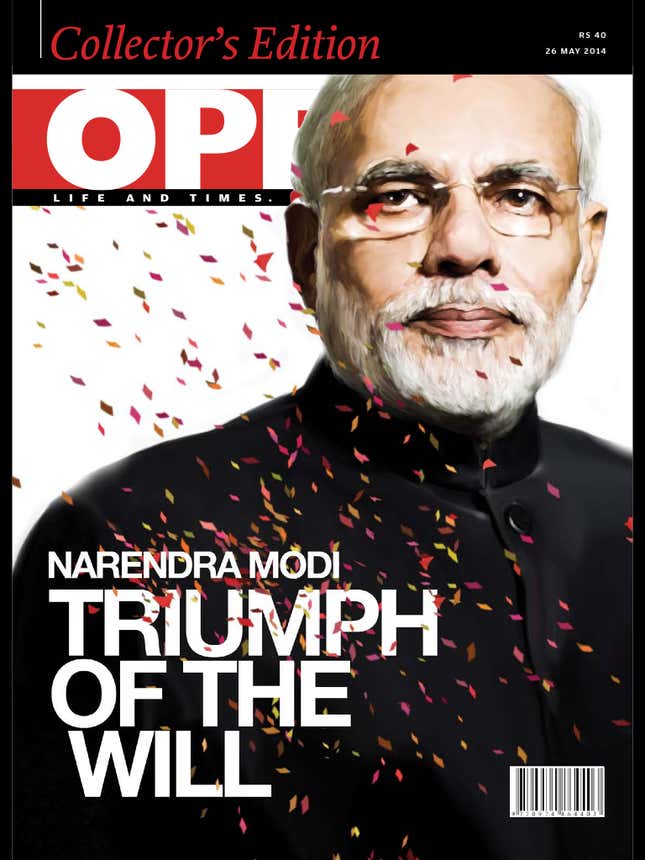Over the weekend, an imposing and inscrutable photo of India’s incoming prime minister, Narendra Modi, was featured on the cover of Open Magazine above the headline “Triumph of the Will.”

This direct reference to Leni Riefenstahl’s 1935 propaganda film, which fundamentally shaped the National Socialist image of effective, fateful, and absolute leadership, is not surprising. As the Bharatiya Janata Party ran an election campaign that was heavily centered on Modi’s leadership qualities and his performance as chief minister of the state of Gujarat, opposing parties frequently evoked comparisons between Modi and Hitler.
The chief minister of the state of Bihar, Nitish Kumar, railed against Modi as a “follower of Hitler and Goebbels,” and Congress prime ministerial candidate Rahul Gandhi likened Modi’s leadership style to Hitler’s self-serving rule, which ultimately would benefit only industrialists. Already two years ago Keshubhai Patel, Modi’s predecessor as chief minister of the state of Gujarat, who subsequently left the BJP in protest, declared that Modi ruled Gujarat like Hitler in a “state of mini-emergency.” Modi’s political coming of age in the paramilitary Hindu nationalist organization Rashtriya Swayamsevak Sangh (RSS), his role in the 2002 Gujarat riots, his vegetarianism, and his messianic rhetoric are also frequently cited in these comparisons. Furthermore, the Delhi-based Centre for Policy Analysis has linked anti-Muslim pre-election violence in Assam to an inflammatory speech by Modi, and Modi’s poetry has been interrogated as possibly indicative of an agenda of ethnic cleansing.
The parallels are highly disturbing, but in seeking to portray Modi in a negative light by comparing him to Hitler, these comparisons missed an important point. While they were meant to evoke fear and prompt voters to reject Modi, some Indian voters actually do see aspects of Hitler in a positive light. Any opposition to Modi needs to address the root of these old and persistent escapist fantasies of Hitler: the disenchantment with the slow-moving messiness of democracy.
For a segment of the Indian electorate, the figure of Hitler is a shorthand for uncompromising leadership, anti-colonial liberation, and technocratic modernity. In this vision, Hitler renounced earthly pleasures to lead his country to glory. Sure, he killed some people in the process and lost the war, but before that he managed to stabilize the economy, do away with corruption and build the Autobahn. Editions of Mein Kampf are readily available in many bookstalls and stores in India, and their jackets often include a short “about the author” paragraph, which presents Hitler as a “fascinating” leader in the ranks of Churchill and Stalin. Children’s books publishers sell comics on Hitler’s life, which describe how “the son of a customs official, Hitler struggled to make a living for himself as a painter.” These books on the “greatest dictator of all time” can be seen displayed together with books on religious figures or Indian national leaders. The recently launched Amazon India website sells a “Hitler Graphic Art Laptop Skin to make your laptop more catchy and stand out from the rest.” A stylized profile of Hitler stands next to the slogan “Think Different.” (The undoubtedly unintended irony here of course is that National Socialism required everyone to think the same way.) As millions of Indians experience lack of basic infrastructure and massive corruption on a daily basis and read it as a failure of the democratic system, the fantasy of an authoritarian leader who “cleans up” India becomes very attractive.
But would 1 billion Indians look the other way like millions of Germans did, when inflammatory rhetoric and violence turned into state-sponsored and organized genocide? Unlike Weimar Republic Germany, India has had many decades of a strong democratic tradition, during which authoritarian leaders have not fared well in the long run (Indira Gandhi was voted out of office after imposing Emergency rule). Unlike Weimar Germany, which did not conceive of itself as a culturally or religiously diverse state, India is a country with a multitude of religions, languages and cultures, which has built its identity on the principle of “unity in diversity.”
Moreover, Hinduism is not a monolithic religion that can be easily equated with National Socialist ideology. And the very qualities of the Indian democratic system that make some Indians at times wish for an authoritarian leader—expanse, complexity, inefficiency of governance, and the need to get approval from many different people—will turn out to be the qualities that will stand in the way of any saffron Hitler, if there were one.